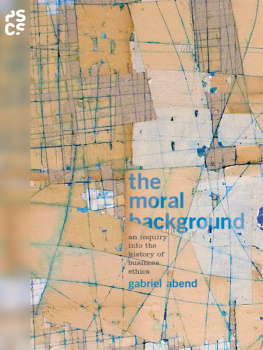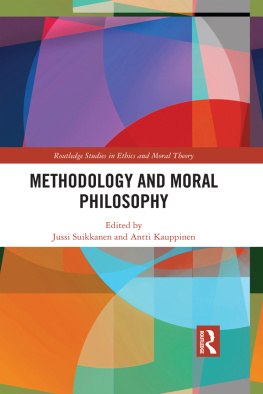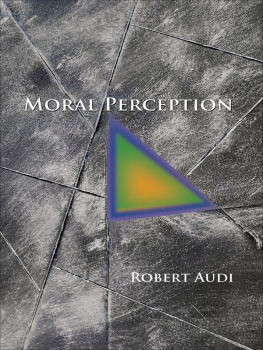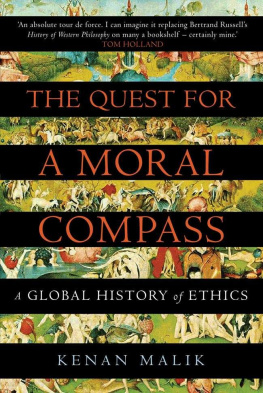
The Moral Background

| PRINCETON STUDIES IN CULTURAL SOCIOLOGY Paul J. DiMaggio, Michle Lamont, Robert J. Wuthnow, and Viviana A. Zelizer, Series Editors A list of titles in this series appears at the back of the book |
The Moral Background
An Inquiry into the History of Business Ethics
Gabriel Abend
PRINCETON UNIVERSITY PRESS
Princeton and Oxford
Copyright 2014 by Princeton University Press
Requests for permission to reproduce material from this work should be sent to Permissions, Princeton University Press
Published by Princeton University Press, 41 William Street, Princeton, New Jersey 08540
In the United Kingdom: Princeton University Press, 6 Oxford Street, Woodstock, Oxfordshire OX20 1TW
press.princeton.edu
Jacket art: Diego Lev, Hombre Torresgarciano (detail) 2008. Book paper and acrylic on cardboard.
All Rights Reserved
Library of Congress Cataloging-in-Publication Data
Abend, Gabriel.
The moral background : an inquiry into the history of business ethics / Gabriel Abend.
pages cm. (Princeton studies in cultural sociology)
Includes bibliographical references and index.
ISBN 978-0-691-15944-7 (hardcover : alk. paper) 1. Business ethicsHistory.
I. Title.
HF5387.A177 2014
174.4dc23
2013035034
British Library Cataloging-in-Publication Data is available
This book has been composed in Minion Pro and Trade Gothic
Printed on acid-free paper.
Printed in the United States of America
10 9 8 7 6 5 4 3 2 1
a mis abuelos
CONTENTS
The Moral Background
INTRODUCTION
That is the introduction. Writing one allows a writer to try to set the terms of what he will write about. Accounts, excuses, apologies designed to reframe what follows after them, designed to draw a line between deficiencies in what the author writes and deficiencies in himself, leaving him, he hopes, a little better defended than he might otherwise be. This sort of ritual work can certainly disconnect a hurried pedestrian from a minor inconvenience he might cause a passing stranger. Just as certainly, such efforts are optimistic when their purpose is to recast the way in which a long book is to be taken.
Erving Goffman, 1974
Occasionally some big business representative does speak less sanctimoniously and more forthrightly about what capitalism is really all about. Occasionally somebody exhumes the apparently antique notion that the business of business is profits; that virtue lies in the vigorous, undiluted assertion of the corporations profit-making function. But these people get no embossed invitations to speak at the big, prestigeful [sic], and splashy business conferenceswhere social responsibility echoes as a new tyranny of fad and fancy.
Theodore Levitt, 1958
1. Moral Causes
In January 2011, the National Commission on the Causes of the Financial and Economic Crisis in the United States made public its final report. This commission was established as part of the Fraud Enforcement and Recovery Act of 2009. Chaired by Democrat Phil Angelides, it reviewed millions of pages of documents and questioned hundreds of individualsfinancial executives, business leaders, policy makers, regulators, community leaders, people from all walks of lifeto find out how and why it [the worst financial meltdown since the Great Depression] happened.difficult question and a most important assignment. What did it find? What was the cause of the crisis?
The final report presents six major findings and conclusions. It sounds plausible that failures in regulation or excessive borrowing can be causes of a financial and economic crisis. Facts about regulation or borrowing seem to be the sorts of facts that account for financial and economic processes and outcomes. But what does ethics have to do with these issues at all? This is how the report spells out the relationship:
The integrity of our financial markets and the publics trust in those markets are essential to the economic well-being of our nation. The soundness and the sustained prosperity of the financial system and our economy rely on the notions of fair dealing, responsibility, and transparency. In our economy, we expect businesses and individuals to pursue profits, at the same time that they produce products and services of quality and conduct themselves well.
Unfortunatelyas has been the case in past speculative booms and bustswe witnessed an erosion of standards of responsibility and ethics that exacerbated the financial crisis.
For example, the report continues, major financial institutions knew a significant percentage of the sampled loans did not meet their own underwriting standards or those of the originators. Nonetheless, they sold those securities to investors. This resulted not only in significant financial consequences but also in damage to the trust of investors, businesses, and the public in the financial system. While the reports causal language is at times ambiguous, there is no doubt that it does mean to make a causal claim. Ethical phenomena are one of the causal antecedents, independent variables, or explanantia, and the economic and financial crisis is the causal consequent, dependent variable, or explanandum.
That moral facts can account for economic facts is in fact a familiar claim. The previous major earthquake in the U.S. economy took place at the dawn of the twenty-first century: a series of spectacular corporate scandals. As an article in the New York Times rightly observed, [a]lmost every year, it seems, some scandal envelops a Fortune 500 company and causes a new spasm of public distrust of What is most remarkable about this otherwise unremarkable New York Times article about business ethics is its date: October 18, 2000, that is, one year before the Enron scandal erupted.
Stories of this sort, in the business-scandal-qua-morality-tale literary genre, would soon become ubiquitous. For, as we know with the benefit of hindsight, the news about Enron, Tyco, and WorldCom was just around the corner. Since their becoming public in 2001 and 2002, these cases have been insistently represented as morality tales, where ethical failures are one key causal factor. These tales afford considerable attention to moral villains, such as Jeffrey Skilling of Enron, Dennis Kozlowski of Tyco, or Bernard Ebbers of WorldCom, who are said to be causally and morally responsible. Eventually, they were sentenced to substantial prison terms, which, so the story goes, they fully deserved. Whether authored by high-status experts or by sensationalistic journalists, moral causation features prominently in public representations of these corporate scandals. For example, in December 2003, former SEC chairpersons Arthur Levitt Jr. and Richard Breeden reflected on Our Ethical Erosion in the Wall Street Journal. They expressed their expert concern about business immoralitythat standards of integrity and character seem to have slipped to dangerous lows at many firmsand its harmful economic effects.
Even more revealing for my purposes is that moral causation also features prominently in more solemn and official accounts, such as the governments reactions. The government had to provide both an appropriate legislative and policy response and a well-founded explanation. Or perhaps the other way around: a well-founded explanation and an appropriate legislative and policy response based on it. Thus, the Sarbanes-Oxley Act of 2002 was based on an account of what happened, what went wrong, why, and hence why that was the causally appropriate response or causally effective antidote. Many things went wrong, but one of them recurrently framed explanatory accounts. Consider, for instance, the U.S. Senates Committee on Banking, Housing, and Urban Affairs hearings regarding the implementation and impact of the Sarbanes-Oxley Act. On September 9, 2003, Republican Richard Shelby, chair of the committee, delivered his opening statement:
Next page









